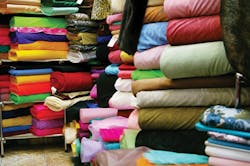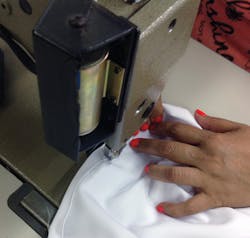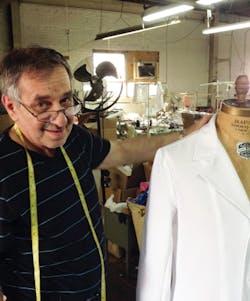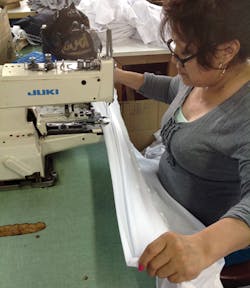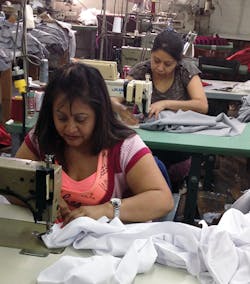Hygienist turns into a fashion designer to add more functionality to uniforms
BY ANNE NUGENT GUIGNON, RDH, MPH, CSP
Scrubs are a very easy solution, but from a fashion and fit standpoint, they leave a lot to be desired. Unless you're built like a fashion model, most of us look like we just rolled out of bed in our pajamas. And everyone's personal thermostat is set at a different point. There are those who are just too hot and others who add layers under the scrubs to keep from freezing. Top off the scrubs with a lab coat, and now whatever shape you are is hidden under a big, rectangular garment, reminiscent of an oversized SpongeBob SquarePants dressed in white. Eventually the inevitable thermostat battle ensues, leaving everyone unhappy and focusing on temperatures-not patient treatments.
So what if there were uniforms that were tailored to fit, flatter your figure, allowed freedom of movement, and met your personal temperature requirements? Impossible, you may say, but not to Debora Carrier, RDH, dental hygienist-turned-fashion designer.
Fate can be a lovely thing. Earlier this year, Debora reached out to me via LinkedIn. After a quick trip to her website, it was apparent she was doing something quite interesting, and I wanted to hear the details. We got to know each other via emails and phone calls. Fate stepped in again and we were able to schedule both a lunch date in Atlanta and a factory tour in New Jersey since I was already destined to be in both areas!
The emerging dream
For 36 years, Debora practiced dental hygiene and taught CPR. She was always cold. She tried layering with long-sleeved T-shirts and tights, but nothing was ever comfortable, professional-looking, or allowed her the range of motion that she needed to do her job. During her CPR classes, she also came into contact with many health-care professionals who ignored OSHA regulations and other standards for their own comfort. She noticed other health-care professionals, especially nurses in the hospital, wearing fleece jackets just to keep warm, so she knew she wasn't alone.
By nature Debora is a problem solver. She knew firsthand that health-care providers have a tough job and focus their time on taking care of others and not themselves. She wanted to bring a little comfort to the workday, so she combined her health-care provider experiences with her fashion background. Debora has been a fashion model for years, so style and fit are important to her.
"Medical wear is definitely lacking from a fashion perspective. Why not raise the bar and dress like professionals and still be comfortable?"
Her journey over the past few years resulted in a new career path and the creation of the company, Twice as Nice Uniforms.
Creating a precision seam.
Sam showing off his handiwork.
Holding the material tightly while sewing on buttons.
Hard at work
Finding the right fabrics, the right style
Debora knew it was going to be a lot of work to achieve her goal of a more professional look, but nothing was going to stop her. From the very start she had to be creative with her time. Her lunch hours at the dental office and nights at home were consumed with research. To keep her dream alive and moving forward, Debora had to learn everything about manufacturing clothing and running a business. It was a crash course, trying to learn as much as possible. She listened intently to her mentor, read everything she could get her hands on, and watched business videos and podcasts. Debora had to raise money, structure a company from nothing, file a patent on her scrubs/liner concept, all while continuing her day job as a clinical dental hygienist. She also joined Launchpad2X, an organization for female entrepreneurs, which is another piece of her new education and a great networking source.
The first order of business was finding new high-tech fabrics that could withstand the rigors of the clinical setting and still be comfortable. Debora realized a uniform with a liner would work. It was a tall order to find a durable outer fabric that was slightly stretchy, wrinkle-proof, stain-resistant, did not fade, but yet was soft to the touch. Next she found an extremely thin, soft fabric for the liner that does not add bulk and met her requirements: temperature regulating, antimicrobial, and moisture wicking.
Once she had the right fabrics, Debora started dabbling in fashion design again. In high school she had designed dresses for her proms and band concerts, so she dusted off her skills and started designing fashionable scrubs with a liner. While not a seamstress, she started creating prototypes from different fabrics until she created a product that she liked. Finally she met with New York City fit specialist, Reneé Bavineau, and together they came up with two styles of scrubs that are flattering to all body types, looking more like sportswear and less like pajamas.
Even though medical scrubs have been around a long time, Debora wanted her product to be a game changer, making it necessary to plot a new course and test the waters. She surveyed dental professionals and nurses, trying to identify the target market, test price points, and key in on colors and style choices. And she listened to what people said, adding pockets for today's smart phones, and even one in the lab coats that will hold a tablet.
Luckily, Debora has a high energy level and is a hard worker, so she has enjoyed the process. She was willing to put in the sweat equity. With total support from her family and everyone in her dental office, she quickly surrounded herself with a team of quality people to provide support for this journey. Finally, with a very heavy heart, Debora knew that she had to devote all of her time and energy to Twice as Nice. After 23 years of clinical practice, she tried to cut her ties, but it was too hard to leave her office completely, so Debora still practices one day a month, enjoying time with her doctor, coworkers, and some of her very favorite patients.
Weaving the pieces together
Factories are interesting places; it's fun to visit actual sites and see how things are made. On a bright spring day, I pulled up in front of a very nondescript, multistory building in North Bergen-a stone's throw from the big New York fashion houses. Reneé Bavineau, now the Twice as Nice COO, ushered me through a dimly lit hallway that twisted and turned deep into the building. We finally emerged into a huge room, brightly lit from natural light streaming through the windows. Every space was jammed with sewing machines, mounds of garments in various stages of assembly, and long tables covered with thick layers of material.
Reneé's pedigree in the fashion industry is stunning. After completing her studies at the Fashion Institute of Technology, she began to hone her skills working with fashion powerhouses such as Ann Taylor, Tahari, Calvin Klein, Lands End, and Macy's. Over the decades, Reneé has amassed an extensive skill set that includes pre-production, sourcing, patterns, fitting, negotiations, and costing. Reneé is the behind-the-scenes person that Debora needed to make her dream of a new uniform, made in America using components made in this country, a reality. That afternoon visit taught me more about fabrics and fashion than I ever thought possible.
Just like our clinical practice, creating a quality garment is demanding and requires the right components and skill sets. The snap-in liner is a knit fabric, while the outer layer of the uniform is woven. The two different fabrics must be sewn with different machines, using different needles. Only a handful of seamstresses are adept at working with both types of fabrics.
But before that step, there has to be a pattern. The art of pattern making and tailoring began to die out when most US clothing manufacturers shut their doors several decades ago. They could not compete with cheap clothing made overseas. Due to her industry connections, Reneé convinced Sam Kasoun, a master tailor and consummate patternmaker, to join the project to create a more custom-fitted uniform. That afternoon, Sam, a soft-spoken man who immigrated from Syria decades ago, was meticulously inspecting the final results of a new pattern, his first prototype for the man's lab coat.
Cutting through layers of fabric is also not easy, if one expects a precision fit. Reneé found just the right person who has years of experience cutting fabric in the production room. A thin paper sheet stamped with all of the pattern pieces is laid on top of many layers of fabric. The cutter adeptly moved a band-saw-like blade across the exact pattern line, ensuring that all pieces will be identical. A handful of highly skilled seamstresses worked intently at their sewing machines, while a handful of others were completing individual tasks. One was adding buttons to women's lab coats, another was turning finished scrub tops into a recognizable garment, while a third woman patiently snipped any loose threads from the seams of the liner, a finishing detail that reminded me of the meticulous way we check every tooth surface with an 11/12 explorer after scaling.
While not the focus of this story, I was struck by the similarity of the ergonomic challenges in the factory as compared to those in our treatment rooms. Garment workers have to be very attentive at all times to what they are doing, for their own safety as well as to ensure the quality of the product. Fabricating a high-quality garment means paying attention to every detail. And their postural challenges parallel what we do as hygienists. We're not the only ones with static postures, using force, repetition, and awkward postures to do our daily tasks.
Made in America
Despite their different backgrounds, both Debora and Reneé are focused on creating a quality product made in this country. They spent hours tracking down American-made components that met their high standards. At times it was a solo find, but sometimes they collaborated to find just the right US manufacturer. From stem to stern, Twice as Nice uniforms are truly an all-American product. Both the liner fabric and the thread are made by North Carolina companies, the waist-band tape is from Philadelphia, the internal snaps that fasten the two layers together comes from a company just down the road in Newark, and the heat transfer for the garment label is made in Los Angeles. Currently they are working to find a stateside resource for the outer layer fabric.
While some may think that "made in America" automatically means a higher price tag, there are significant hidden costs in relying on offshore suppliers. A small enterprise like Twice as Nice can't operate efficiently if there is global uncertainty or disruption; there is too much risk. What happens if the components don't show up on time? The vast majority of products made in Asia are shipped in containers in huge ocean freighters. A shipping strike at an import entry point, such as the docks in Los Angeles or Oakland, could stop production very quickly. What if there is a paperwork issue with customs? What if the supplier is based in a country where there is internal chaos or a severe currency fluctuation? Debora and Reneé want to keep their employees busy and productive. They want American workers to live and prosper, and missing or delayed components means no one works.
Once Debora and Reneé had all of the wheels in motion, initial production began in late October 2014. They set their sites for a January 2015 launch, a time frame that translated into nonstop production, seven days a week. While the rest of us were enjoying the Thanksgiving holiday festivities, Reneé and her team of talented seamstresses were hard at work creating the first run of uniforms. It was a push, but by January there was enough stock to offer an initial selection of Twice as Nice uniforms online.
By the first of the year, there were scrubs and lab coats in traditional female sizes ranging from XS to XL with two distinct styles that flatter different body styles, available in six different colors. The Darla style flatters more curvy body types, while the Deb selection is fashioned for a more slender build. Within a short time, there were inquiries from males, who also wanted comfortable, stylish uniforms. The company is now working to expand their line to include uniforms for petites, plus sizes, and tall customers.
Family matters
According to Debora, each one of her partners came with a different skill set, and all complement one another quite well. But beyond her business mentor and angel investor, she turned her business into a real family affair. Sister Darla handles the website and works as Debora's assistant. Another sister, Dea, manages marketing, communications, social media, and public relations. Her son, Jordan, shares his mother's artistic eye and handles the company's graphic needs. He designed the Twice as Nice logo and creates brochures, handouts, and patterns for the brand. Niece Amy keeps up with Instagram and Pinterest. Since the distribution warehouse is located in Atlanta, niece Sara and nephew Ryan also work with Amy on inventory and unpacking uniforms shipped in from New Jersey. Not to be left out, Debora's mom, Ann McKenzie, folds and places products in the final packaging.
Debora's value system and work ethic reflect her Midwest upbringing and the years spent studying dental hygiene at Harper College in Palatine, Illinois. "Twice as Nice Uniforms is based on integrity and honesty. I want to work side by side with my employees and earn their respect and trust. My company has to be transparent, open to change, and strive for the best possible customer service."
Word is getting out. Hygienists who are members of Facebook communities are chatting about the uniforms. Debora is being approached by various distributors who have heard about her high-quality uniforms. Atlanta Dental's new division, Simply Hygiene, invited her to join their booth at this summer's ADHA Annual Session in Nashville, and she also exhibited at RDH Under One Roof in Las Vegas. But just like everything else, Debora is keeping the growth of Twice as Nice at a steady pace.
"I believe in this country and wish to support it as much as I can. Twice as Nice Uniforms supports manufacturing in the USA and the textile workers in this country."
Despite the fact that Debora had to learn everything from the ground up, her initial foray into the business world has been relatively free of problems, a testament to her diligence at the front end and her company motto: Bringing comfort to those who bring comfort to others. While her dental hygiene patients surely miss her clinical skills, the rest of us are the new beneficiaries of her amazing talents.
Kudos to Debora, her family, and her entire team for believing the American dream can still work. Their perseverance will help keep our country strong. RDH
ANNE NUGENT GUIGNON, RDH, MPH, CSP, provides popular programs, including topics on biofilms, power driven scaling, ergonomics, hypersensitivity, and remineralization. Recipient of the 2004 Mentor of the Year Award and the 2009 ADHA Irene Newman Award, Anne has practiced clinical dental hygiene in Houston since 1971, and can be contacted at [email protected].

